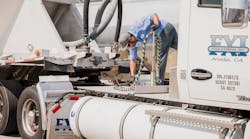Southern California Gas Co. (SoCalGas) and Food Express Inc. (FXI) have added 11 new ultra-low emission natural gas trucks to the FXI fleet.
The company, with the assistance of SoCalGas, applied for and received $1.1 million in grant funding for the new trucks which started making deliveries last week. The company has an additional 35 trucks on order. Funding was received from the Prop 1B program administered by the San Joaquin Valley Air Pollution Control District and the California Hybrid and Zero-Emission Truck and Bus Voucher Incentive Program (HVIP).
“As the owner of a local business that’s been in my family for four generations, it is important that our company be part of the clean air solution,” said Kevin Keeney, vice president of Arcadia, Calif.-based Food Express, Inc. “We’ve heard from many customers over the last few years about ways we can make our operation more environmentally-friendly. Our fleet travels about 7.5 million miles in California each year and the technological advancements of these new heavy-duty engines made our decision to switch to natural gas trucks an easy choice.”
The purchase of 46 new trucks represents about 50% of FXI’s California fleet. The company is on the waitlist for an additional $900,000 in Prop 1B grants from the San Diego Air Pollution Control District, which would be used to purchase another nine trucks. Replacing 55 diesel trucks with new ultra-low emission natural gas trucks is the equivalent of taking more than 3,100 passenger cars off the road, according to the companies.
“Over the last year, we’ve assisted SoCalGas customers with more than 400 applications for incentive funding to use for the trade in of existing diesel trucks for new natural gas ones,” said Yuri Freedman, senior director of business development for SoCalGas. “At a time when greenhouse gas emissions from the transportation sector are increasing, the move to clean technologies is vital if California is to achieve ambitious 2030 greenhouse gas emissions reduction goals and air quality goals. These new natural gas trucks represent the only solution commercially available and will have an immediate impact on air quality.”
The transportation sector is responsible for about 41% of California’s greenhouse gas emissions and more than 80% of the state’s NOx emissions. These new heavy-duty natural gas trucks cut smog-forming emissions by more than 90% compared to the cleanest heavy-duty diesel trucks on the road today. When these ultra-low emission natural gas trucks are fueled by renewable natural gas, greenhouse gas emissions are reduced by at least 80%. Already, close to 70% of natural gas fleets in California are fueled with renewable natural gas.
Results from a recent study conducted by the University of California-Riverside helps to understand one reason replacing these diesel trucks is so important. The study showed that NOx (smog-forming) emissions from diesel trucks are “actually much higher” than California Air Resources Board certification standards. The study cited the poor performance of aftertreatment systems for diesel vehicles as the main reason. FXI replacing some of the oldest diesel trucks in its fleet with the ultra-low emission natural gas trucks will help achieve California’s clean air goals.
FXI transports flour and malt barley throughout California for use in products such as bread, ramen noodles, tortillas and craft beer.



